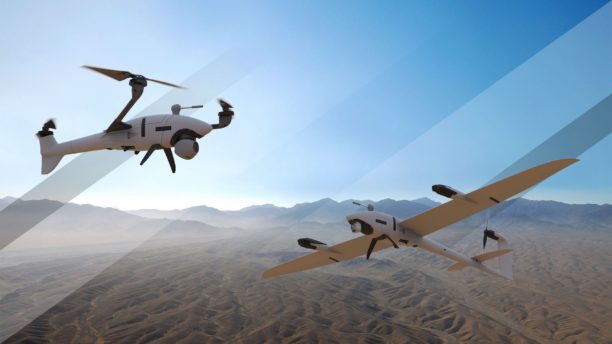AI-Powered Drones Demonstrate Advanced Capabilities in Radio-Jammed Environments, Paving the Way for Future Combat Systems
by DRONELIFE Staff Writer Ian J. McNabb
European aerospace giant Airbus and German drone developer Quantum Systems recently announced that their AI drone swarm technology had been successfully tested at the Airbus Drone Center near Manching, marking the conclusion of testing sponsored by the Bundeswehr.
Commissioned by the German Armed Forces in July 2023, the study aims to maximize the potential of artificial intelligence to coordinate mixed UAS swarms with different capabilities. The specially developed mission-AI “controls and coordinates the UAS systems to ensure reliable mission execution even in scenarios with radio interference or a complete failure of individual drones.” To train the AI, Quantum Systems and Spleenlab used deep reinforcement learning in a controlled environment to ensure precise and valid decisionmaking
As part of the testing, Vector and Scorpion UAVs from Quantum Systems, alongside two other multi-purpose drones from Airbus, were deployed in an AI-powered “swarm” configuration. The reconnaissance data from all drones was merged in real-time to form a joint situational picture, which was then integrated into the Airbus “Fortion Joint C2” battle management system. The Vector drones demonstrated their ability to autonomously perform missions such as joint reconnaissance and target acquisition under GPS-denied conditions (GNSS denied). As systems jamming remains a significant threat in difficult operating environments like Ukraine, the success of these tests highlights the potential for AI to aid in real battlefield conditions.
Sven Kruck, CRO and Managing Director of Quantum Systems, said, “We are not just expanding the technological capabilities of our drones. We give customers and users a real advantage in real-life scenarios. It’s about protecting soldiers and increasing safety. In the future, there will be no way around software-based and AI-supported systems for drone technology.”
The research results from the KITU2 study are intended to support the development of autonomous systems for major Bundeswehr projects such as the Main Ground Combat System (MGCS) and the Future Combat Air System (FCAS).
More information on Quantum Systems is available here.
Read more:
Miriam McNabb is the Editor-in-Chief of DRONELIFE and CEO of JobForDrones, a professional drone services marketplace, and a fascinated observer of the emerging drone industry and the regulatory environment for drones. Miriam has penned over 3,000 articles focused on the commercial drone space and is an international speaker and recognized figure in the industry. Miriam has a degree from the University of Chicago and over 20 years of experience in high tech sales and marketing for new technologies.For drone industry consulting or writing, Email Miriam.
TWITTER:@spaldingbarker
Subscribe to DroneLife here.

